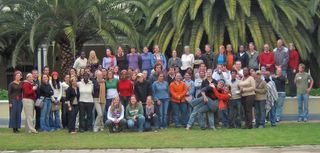The following is an article from the UNICEF web site http://www.unicef.org/infobycountry/southafrica_34550.html :
Harm children no more: Why Africa must rediscover Soweto
© Peter Magubane/1976
Students in Soweto Township, South Africa protest in 1976.
By Yvonne Chaka Chaka
UNICEF Goodwill Ambassador for Eastern and Southern and Africa Yvonne Chaka Chaka, a South African musician and businesswoman, offers reflections and a call to action on the Day of the African Child.
SOWETO, South Africa, 15 June 2006 – I was born and raised in Soweto. My mother still lives here, a place whose heart and soul courses through my veins. Once the Soweto bug catches you, it never leaves.
South West Township, otherwise known as Soweto, has grown from a 1904 settlement housing black miners into a modern metropolis. Beyond its cornrows of brightly coloured houses and corrugated iron sheets, the township’s rhythm permeates national politics, fashion, music, dance and language. Soweto’s heartbeat also echoes across Africa.
For those old enough to remember, Soweto symbolizes courage. In 1976 during apartheid, young people my age, (I was 11), angry at being taught Afrikaans – seen as the language of oppression – decided to protest. On 16 June, 10,000 of them, mostly school children, took to Soweto’s streets in peaceful demonstrations.
The authorities responded with force. Armed police lobbed tear gas into the crowd and the students retaliated with rocks. When the mayhem was over, 152 children lay dead. The protests continued into 1977, by which time over 700 young lives had been lost. On 26 June that year, the government revoked the teaching of Afrikaans in all-black schools, a triumph for the anti-apartheid movement.
‘Stop Violence against Children’Fifteen years later, in 1991, the Organization of African Unity immortalized the Soweto Uprising by declaring 16 June the Day of the African Child. This declaration marked an official recognition of the children’s contributions to the struggle against apartheid.
This year’s Day of the African Child has as its theme, ‘Stop Violence against Children.’
Incidents of young girls, especially orphans, being raped or molested are reported every day in the media. The perpetrators – often fathers, uncles or neighbours – go unpunished because law-enforcement officers regard these crimes as domestic matters. For these children, though, the family – that sanctuary of peace and safety – has become a haven of impunity and a source of horror.
Where institutions to provide safety for abused children exist, they are woefully inadequate or poorly funded. The violence that is prevalent in the home, in fact, may simply be transferred to the institution.
© UNICEF South Africa/2005
Abuses perpetrated in schoolsA majority of children face violence in schools. Children are beaten, caned or whipped by school authorities, whose job is to protect them from violence. Corporal punishment teaches children that physical punishment is an acceptable way to resolve issues. It should not be allowed because it legitimizes violence.
A recent study by the Nelson Mandela Foundation found that children in South African rural schools were physically punished for being late, yet it was their parents who gave them chores to finish. Children were also punished for not paying school fees.
Adolescent girls in school are more likely to be victims of sexual violence, and the perpetrators are usually male teachers. In countries with high HIV prevalence rates, sexual abuse does not just hurt the victim; it is, quite often, a death sentence.
Boys, too, suffer violence. Bullies and gangsters roam many school grounds, inflicting terrible psychological damage on their victims.
Robust action neededViolence against children needs to stop. But how? How will Africa stop this madness from engulfing its young lives?
We need an iron-clad resolve from the highest levels of political leadership. When they memorialized 16 June in 1991, our presidents were in effect saying, “Never again will Africa’s children be violated, abused and mowed down in the manner of the Soweto massacre.” That resolve needs to be rediscovered. Ceremony alone is simply not good enough.
Governments need to take two important steps. First, they should put in place strong, comprehensive laws for protecting children. Second, they should make sure that these laws are vigorously enforced.
The international community has taken this issue seriously. In 2003, UN Secretary-General Kofi Annan appointed Professor Paulo Sergio Pinheiro as an Independent Expert to study violence against children.
Mr. Pinheiro’s report, to be presented to the UN General Assembly, will outline measures that governments and the international community need to take in order to make the world a safer place for children.
Violence begets violence. Only strong, robust action against the cycle of violence will fit the tribute that Soweto’s young heroes truly deserve.



